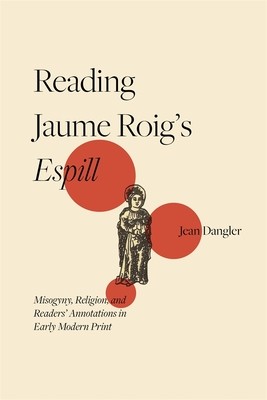
- We will send in 10–14 business days.
- Author: Jean Dangler
- Publisher: Tamesis Books
- ISBN-10: 185566416X
- ISBN-13: 9781855664166
- Format: 15.6 x 23.4 x 1.3 cm, kieti viršeliai
- Language: English
- SAVE -10% with code: EXTRA
Reviews
Description
What lessons did readers take from the Espill (The Mirror)?
This book examines key marginalia in sixteenth-century printed copies of the fictional, pedagogic tale about the alleged dangers of earthly women composed by Valencian physician Jaume Roig. Written in Catalan verse in approximately 1460, the Espill focuses on two main themes, misogyny and religious material, including the critique of religious personnel but also absolute praise of the Virgin Mary. More than 50 printed copies of the work exist today, an extraordinary number for the period. The book argues that readers seemed to interpret contrasting secular misogyny and holy topics as harmonious, with the Espill's misogyny synchronizing with its religious message and materials. Readers appear to have considered the Espill as a guide, whether with regard to biblical stories and lessons, women's menstruation, or women's shameful character, and did not demonstrate outrage or perplexity about women's portrayal. The annotative evidence, previously overlooked, sheds light on misogyny's relationship to larger systems of power and on the broader connection between women's depiction in the Espill and in Isabel de Villena's proto-feminist Vita Christi, both of which derived from Valencia's same late fifteenth-century social and professional milieu.EXTRA 10 % discount with code: EXTRA
The promotion ends in 23d.22:41:51
The discount code is valid when purchasing from 10 €. Discounts do not stack.
- Author: Jean Dangler
- Publisher: Tamesis Books
- ISBN-10: 185566416X
- ISBN-13: 9781855664166
- Format: 15.6 x 23.4 x 1.3 cm, kieti viršeliai
- Language: English English
What lessons did readers take from the Espill (The Mirror)?
This book examines key marginalia in sixteenth-century printed copies of the fictional, pedagogic tale about the alleged dangers of earthly women composed by Valencian physician Jaume Roig. Written in Catalan verse in approximately 1460, the Espill focuses on two main themes, misogyny and religious material, including the critique of religious personnel but also absolute praise of the Virgin Mary. More than 50 printed copies of the work exist today, an extraordinary number for the period. The book argues that readers seemed to interpret contrasting secular misogyny and holy topics as harmonious, with the Espill's misogyny synchronizing with its religious message and materials. Readers appear to have considered the Espill as a guide, whether with regard to biblical stories and lessons, women's menstruation, or women's shameful character, and did not demonstrate outrage or perplexity about women's portrayal. The annotative evidence, previously overlooked, sheds light on misogyny's relationship to larger systems of power and on the broader connection between women's depiction in the Espill and in Isabel de Villena's proto-feminist Vita Christi, both of which derived from Valencia's same late fifteenth-century social and professional milieu.

Reviews